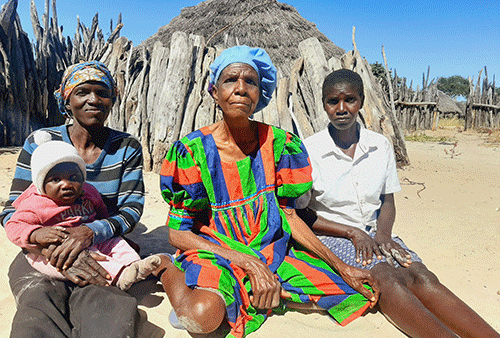An elderly Ohangwena pensioner is fighting tooth and nail to win back her 24-year-old grandson who was put up for closed adoption by the authorities.
Linea Ngeno (74) is distraught over a child welfare ministry decision to put up his grandson for adoption, claiming the family was not approached for consent.
Closed adoption is a form of adoption in which the biological parents or family have no direct contact with the adoptive family, and the adoptive parents often know little or nothing about the biological parents.
A senior social worker based at the Eenhana hospital and who has been on the ground since the day the adopted child’s mother died, said she was also not informed about him being taken up for closed adoption.
According to Ngeno, the family tried several times to trace the adopted man but to no avail.
The adopted man was born in 1998. His mother died shortly after giving birth to him, while his father also passed on in 2000.
According to Ngeno, her grandson was taken to Eenhana hospital in the care of a nurse because he was still a baby.
Later on, when he turned a year and eight months, he was moved to an orphanage in Windhoek.
“When my grandson was in Eenhana hospital, in the care of nurses, I have always been visiting him, taking oshikundu to him and sometimes we used to sit outside the ward,” she recalled. Ngeno told New Era she has been experiencing high levels of stress when she found out that her grandson was put up for adoption without the family’s consent.
She claimed her blood pressure condition has also deteriorated since then. Ngeno narrated when her daughter died, they agreed to let the child stay at the Eenhana hospital since they were unable to take care of him.
She added her grandson was even baptised in a local church, while still in custody of health professionals from Eehana.
“When the child turned one year and eight months old, the chief social worker approached us and said the child will be moved to a Windhoek orphanage,” she further explained.
Ngeno stressed that after her grandson was placed in Windhoek, she was always in contact with the social worker in Eenhana, to find out how he is doing in Windhoek.
“In 2016, the social worker at Eenhana told me that the child went for closed adoption and we will no longer see him,” she said.
This prompted Ngeno, with the help of her grandson’s paternal relatives, to look for help from government offices.
However, she said, they did not get any assistance to win back their adopted loved one.
“We started to confront the social worker at Eenhana that we want our child but she keeps telling us that the child went for closed adoption and she was also not informed about it, since she is the one who placed him,” she said.
Investigate
An aunt of the adopted man, Helena Tobias, said they want him back immediately.
“The ministry should investigate the people who were working at the orphanage during that period and give us a clear and valid reason why they gave away our child,” Tobias fumed.
The chief social worker in the ministry of health, Josephine Nghiishililwa Kapweya, who placed the child in Windhoek, said she is not happy with the way the ministry has handled the matter. She questioned why the ministry opted for closed adoption without consulting the immediate family. She also claimed no local social worker was consulted before the closed adoption.
“I was not informed that they are giving away the boy, they did not consult me. I was shocked when I heard the child went for closed adoption,’’ she lamented.
Kapweya said in 2016, she called the orphanage to enquire how the boy was doing and later on she was told he was no longer housed there. “I wrote a letter to the gender ministry enquiring how the child went for adoption but I was told that I don’t have a right to follow up, but only the family would be able to enquire about him,’’ she said.
‘Above board’
Approached for comment, child welfare ministry spokesperson Lukas Haufiku said the closed adoption was done in accordance with the Children’s Act (Act 33 of 1960), now the Child Care and Protection Act (Act 3 of 2015). Therefore, the man gave consent himself.
“According to the social worker’s assessment, the child in question has been in need of care since birth. It also revealed that no family member was willing to care for the child, and the only other willing person was his grandfather, who was 85 years-old at the time and in need of care himself,” said Haufiku.
He also said the man spent 10 years in an orphanage home before he consented to adoption. This means, he said, the family had about 10 years to claim the child, but no one came forth. “That is, consent to adopt a child cannot be given by anyone other than someone appointed by the court as legal guardian or the biological parents. The parents could not consent in this case because they had both died at the time of the adoption,” he said. Haufiku stressed that the man is now over the age of 18 and he has the option of agreeing or refusing to learn about his biological family. He should be consulted in this regard as he could have his reasons why he stayed away from his biological family thus far.
“It is important to note that the ministry is guided by legislations in carrying out its mandate and services, and this particular case was informed by the Children’s Act (Act 33 of 1960), now the Child Care and Protection Act (Act 3 of 2015), which gives effect to the rights of children as contained in the Namibian constitution and international agreements binding on Namibia to set out principles relating to the best interests of children,” he added.


